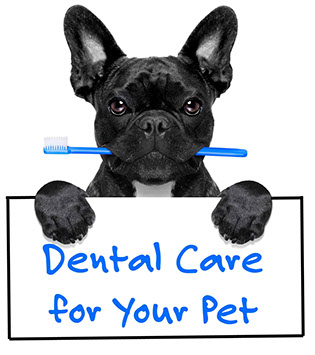
Why is your pet’s dental health important?
by Angela Steinley, DVM
Your pet’s dirty teeth can affect more than just their mouth. They can have a significant effect on their overall health. When the teeth get dirty, plaque and tartar build up on the teeth (dark stuff you see on the teeth), and they are covered in bacteria. The gums are fragile from the infection and bleed, allowing the bacteria to constantly enter the blood stream. Once in your pet’s blood these bacteria can spread all through the body. They particularly cause problems in the heart and kidneys. Bad teeth can be one cause of a chronic cough or a sneezing problem.
- Teeth that get really infected can become loose, causing your pet pain every time they try to eat.
At Home Care
- Home care can help prevent your pet’s teeth from becoming dirty and diseased. The following are several things you can do to help keep your pet’s mouth healthy:
Brush their teeth- you can use a regular adult or child tooth brush. DO NOT use human tooth paste. There is too much fluoride in human tooth paste and it can make your pet sick. There are specially made pet tooth pastes you can use, or just use the tooth brush and water. To get your pet used to having their teeth brushed start by slowly introducing the tooth brush to them and just doing a little at a time. Reward them when you are done with a small hard treat.
Special liquids to place on their teeth- several companies make liquids and gels that can be placed on your pet’s teeth that help prevent the buildup of plaque and tartar.
Food- Hard food is better for your pet’s teeth because it has some natural cleaning action as they chew. There are several diets made by Science Diet especially for dental care. Science Diet (Hills) Oral Care is an over the counter food you can use to help improve your pet’s teeth. This food is in bigger chunks that help to clean the teeth off as your pet chews. Science Diet (Hills) t/d is a prescription food that is even better at keeping a pet’s teeth clean. Both of these foods work best if fed as the main diet, but can be used as treats to supplement the normal diet.
Chew treats- Rawhides and other treats designed for chewing (ex: Greenies) can be helpful in keeping your pet’s teeth clean. Be sure to watch your pet when they enjoy these treats and make sure they chew them well and are not swallowing large pieces that could become stuck in their throat or intestinal tract.
The important thing to remember about most of these home care suggestions is that they help to prevent your pet’s teeth from getting worse. Once the hard tartar builds up on the teeth the only real way to get them clean is with a professional cleaning by your veterinarian. The exception to this is if you feed the t/d food as the main diet for your pet. This diet will remove some of the built up tartar over time, but not all of it.
Why should you have your pet’s teeth cleaned by your veterinarian?
- As mentioned above this is the only way to get off the tartar you see built up on your pet’s teeth.
- Cleaning your pet’s teeth can help stop the constant shedding of bacteria into their system. This helps prevent other infections throughout the body.
- Pain- infected teeth that are covered in bacteria can be loose and hurt. Remember when you were a kid and had a loose tooth, now imagine that the tooth is not only loose but infected as well. Dogs and cats are very good at hiding mouth pain and many times will continue to eat even with several teeth that are rotting and loose in their mouth.
- The best time to have a dental done is before your pet’s teeth get really bad. By cleaning them early you can save many of the teeth that would otherwise become so diseased they would have to be pulled. Once the teeth and gums get so damaged they can not be repaired.
What is done during a “Dental”
- If your pet’s teeth are very dirty your vet may place your pet on antibiotics before the dental to try and lower the number of bacteria in the mouth and on the teeth before the dental is performed.
- Anesthesia is needed to perform a dental on your pet. The reasons for this include the following:
- Dogs and cats do not understand what we are doing and will not sit still for us to do a good cleaning on their teeth if they are awake. One of the most important steps in cleaning the teeth is cleaning below the gum line. It is almost impossible to reach these areas on an awake dog.
- Many times pets will have infected teeth and it would be painful for them to be worked on while awake.
- When an animal is put completely under anesthesia an endotracheal tube is placed in their trachea. This protects their lower airways from the bacteria and water that will be in the mouth during the dental cleaning. An animal that is awake or only sedated could easily breath in some of that water and bacteria and get pneumonia.
- Before the cleaning is started a solution is applied to the teeth to help kill some of the bacteria in the mouth and on the teeth to prevent further shedding during the cleaning.
- Scaling is the first step to cleaning the teeth. An ultrasonic scaler is used to vibrate the plaque and tartar off the teeth and also to clean below the gum line.
- Once the teeth are cleaned off they are polished with a special tooth paste like substance and an attachment to the dental machine.
- After the teeth have been cleaned and polished a veterinarian will inspect the mouth for teeth that are infected or loose and need to be pulled.
- If teeth need to be pulled, pain management is recommended. A combination of injectable pain medications and local blocks will be used to help prevent your pet from feeling pain.
- X-rays can be very helpful for determining what teeth are diseased and need to be pulled.
Possible complications from a Dental
- Complications are more common if your pet has very bad teeth. If you have their teeth cleaned early before they get really bad there are very few complications associated with a dental procedure.
- Anesthesia
- There is always a risk when an animal is under anesthesia. Young animals tend to be at less risk than older ones.
- Running blood work (pre-anesthesia chemistry panel) is one way you can help prevent some of the risk. This blood work can help your vet know more about your pet’s liver, kidneys, and hydration status and change the anesthesia protocol if needed.
- It is also a good idea to have a full exam on your pet before anesthesia. This will help to identify problems such as heart murmurs or infections.
- Broken tooth roots- if a root breaks off a tooth during an extraction and can not be fully removed it could cause an abscess in the future. This is why we try to remove all teeth fully and completely.
- Fractured jaw- if your pet has such severe dental disease that has started to infect the underlying bone, there is the possibility that the jaw could break while damaged teeth are being removed. This is usually only a problem in pets with extremely bad teeth, and the risk can be significantly reduced by having a pet’s teeth cleaned when they are young before they get bad.
How often should your pet have a “Dental”
- How often your pet needs to have their teeth professionally cleaned will vary a lot depending on the dog. It is recommended that you have your pet’s teeth looked at least once a year by your veterinarian to see if they need to be done.
- Small breed dogs tend to need their teeth cleaned more frequently than large breed dogs. Some of the small dogs may need to be done every six months. The younger they are when they start to have their teeth cleaned the less frequently they will need them cleaned when they get older (because you prevent a lot of the problems before they start). Also, the earlier you start having their teeth cleaned the less likely it is that teeth will have to be pulled.
- Breeds more likely to have bad teeth and need dentals more frequently include: yorkies, dachshunds, chihuahuas, toy poodles, shih tzus, and pomeranians. Some of these dogs may need a dental as early as 1-2 years old.
-
Other signs that your pet may need their teeth cleaned:
- Bad smelling breath
- Drooling excessively
- Pawing at their mouth
- Not wanting to eat hard food
- Tartar build up on the teeth (the brown stuff on the teeth)
- Blood on chew toys
Download this article:









<
>













